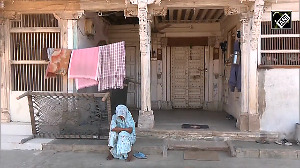I'd dearly love to own a beast of my own...," said Raj Singh, describing his job as an elephant handler to me, adding, "except that most of us mahouts can't afford them!"
Which isn't surprising, as a healthy female elephant (which Jaipur mahouts prefer, for they're supposedly more docile) could cost more than a new Maruti van, he said. That's why he was constantly on the lookout for animals going cheap.
I asked where they normally bought elephants. "Sadly, they don't breed in Rajasthan," said Singh, "so I've often gone to the annual animal fair in Bihar to source them for my employers."
Lowering his voice, he added, "I've recently heard that there are some suppliers in Assam selling elephants cheap." I asked why and he said nonchalantly, "I'm not really sure, but some say maybe they steal them from the jungles!"
This was a big deal, I realised. Given the fact that elephants are Schedule 1 animals, their trade is illegal. The wildlife department does issue permits, but elephant handlers say these are hard to obtain.
"The red tape doesn't deter people from buying elephants - it just forces people to forge the permits," Singh shrugged. Others, he said, who managed to get one permit, kept as many as a dozen elephants on it: "After all, it's not easy to tell one elephant from another, and if they're not kept together, who can possibly keep track!"
My mind was boggling at the sheer ease with which something as large and temperamental as an elephant could be hidden so easily from the authorities. "But surely someone would spot the stolen elephants en route from Assam to Rajasthan," I protested, "isn't there checking at the state borders?" "Which world do you live in madam?" Singh countered, "there are ways of getting through all the checkposts, past every possible barrier." So, of course, I wanted to know exactly how the poachers and black marketers did it.
"After the poachers steal the elephants - and mind you, I've heard they usually take young calves which are easier to tame - they arrange with transporters to ferry them across the country in trucks," Singh explained, adding quickly that being only a mahout and not an elephant buyer, this information was only on hearsay.
"The truck takes about eight days, sometimes a day more, to reach Jaipur from Assam," he said, "that's the standard time taken for cargo to be transported across that much distance."
But we were talking elephants here, I protested, creatures not generally known for their docility, especially when they were being kidnapped. How did they handle being cooped up in a smelly bumpy vehicle for such a long time, I asked.
"All I know is that they reach the market in passable health," said Singh, "the elephants represent a lot of money, so obviously they are well taken care of!" I wondered whether the animals needed to be manacled: "How else would they ensure they didn't peep out at an inter-state barrier?" I asked.
The mahout shrugged, obviously not interested by my interest in the logistics of it all. "They probably starve the elephants a little, I guess, which makes them lethargic and docile. And give a hefty shot of sedative if that fails!" he said.
Weren't the buyers of poached elephants risking getting caught without papers by the authorities? I was sure it would take all sorts of ingenuity to explain away a stolen elephant. Singh grinned: "At the end of the day, if buying a stolen animal means I get it cheap, I'm willing to take my chances!"






 © 2025
© 2025